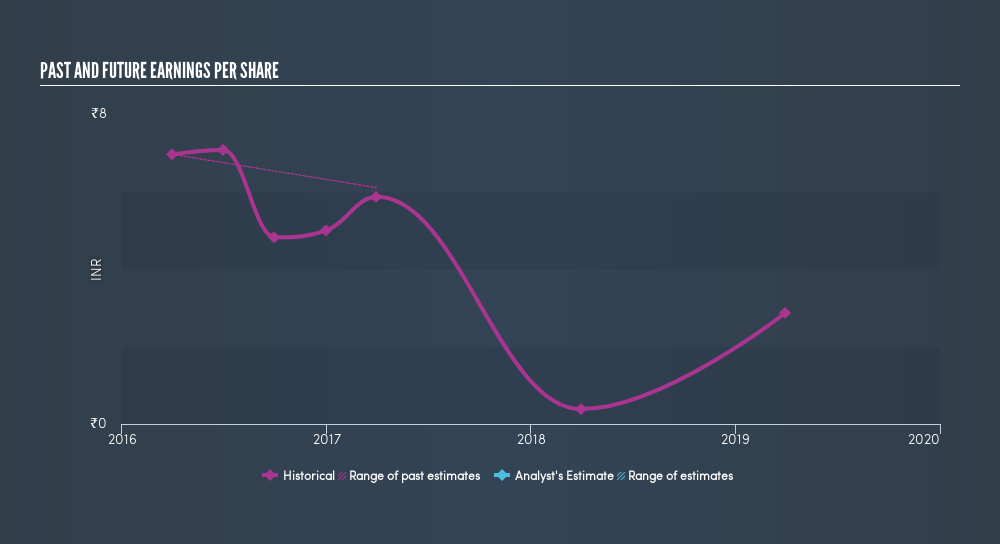- India
- /
- Diversified Financial
- /
- NSEI:PFS
Such Is Life: How India Financial Services (NSE:PFS) Shareholders Saw Their Shares Drop 58%
Want to participate in a short research study? Help shape the future of investing tools and you could win a $250 gift card!
If you love investing in stocks you're bound to buy some losers. Long term PTC India Financial Services Limited (NSE:PFS) shareholders know that all too well, since the share price is down considerably over three years. So they might be feeling emotional about the 58% share price collapse, in that time. Unhappily, the share price slid 3.1% in the last week.
See our latest analysis for India Financial Services
To paraphrase Benjamin Graham: Over the short term the market is a voting machine, but over the long term it's a weighing machine. One flawed but reasonable way to assess how sentiment around a company has changed is to compare the earnings per share (EPS) with the share price.
India Financial Services saw its EPS decline at a compound rate of 26% per year, over the last three years. So do you think it's a coincidence that the share price has dropped 25% per year, a very similar rate to the EPS? We don't. So it seems like sentiment towards the stock hasn't changed all that much over time. Rather, the share price has approximately tracked EPS growth.
You can see below how EPS has changed over time (discover the exact values by clicking on the image).

We know that India Financial Services has improved its bottom line lately, but is it going to grow revenue? Check if analysts think India Financial Services will grow revenue in the future.
What About Dividends?
As well as measuring the share price return, investors should also consider the total shareholder return (TSR). The TSR is a return calculation that accounts for the value of cash dividends (assuming that any dividend received was reinvested) and the calculated value of any discounted capital raisings and spin-offs. So for companies that pay a generous dividend, the TSR is often a lot higher than the share price return. In the case of India Financial Services, it has a TSR of -55% for the last 3 years. That exceeds its share price return that we previously mentioned. This is largely a result of its dividend payments!
A Different Perspective
Investors in India Financial Services had a tough year, with a total loss of 13% (including dividends), against a market gain of about 0.05%. Even the share prices of good stocks drop sometimes, but we want to see improvements in the fundamental metrics of a business, before getting too interested. Regrettably, last year's performance caps off a bad run, with the shareholders facing a total loss of 12% per year over five years. Generally speaking long term share price weakness can be a bad sign, though contrarian investors might want to research the stock in hope of a turnaround. Keeping this in mind, a solid next step might be to take a look at India Financial Services's dividend track record. This free interactive graph is a great place to start.
Of course India Financial Services may not be the best stock to buy. So you may wish to see this free collection of growth stocks.
Please note, the market returns quoted in this article reflect the market weighted average returns of stocks that currently trade on IN exchanges.
We aim to bring you long-term focused research analysis driven by fundamental data. Note that our analysis may not factor in the latest price-sensitive company announcements or qualitative material.
If you spot an error that warrants correction, please contact the editor at editorial-team@simplywallst.com. This article by Simply Wall St is general in nature. It does not constitute a recommendation to buy or sell any stock, and does not take account of your objectives, or your financial situation. Simply Wall St has no position in the stocks mentioned. Thank you for reading.
About NSEI:PFS
PTC India Financial Services
A non-banking finance company, provides project financing services for entire energy value chain through investment and lending into such projects.
Solid track record with adequate balance sheet.
Market Insights
Weekly Picks

Early mover in a fast growing industry. Likely to experience share price volatility as they scale


A case for CA$31.80 (undiluted), aka 8,616% upside from CA$0.37 (an 86 bagger!).


Moderation and Stabilisation: HOLD: Fair Price based on a 4-year Cycle is $12.08
Recently Updated Narratives


An amazing opportunity to potentially get a 100 bagger

Amazon: Why the World’s Biggest Platform Still Runs on Invisible Economics

Sunrun Stock: When the Energy Transition Collides With the Cost of Capital
Popular Narratives


MicroVision will explode future revenue by 380.37% with a vision towards success


Crazy Undervalued 42 Baggers Silver Play (Active & Running Mine)



